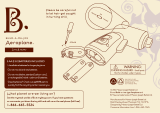POWC20100 EN
Copyright © 2021 VARO P a g e | 4 www.varo.com
▪ If devices are provided for the connection of dust extraction and collection facilities, ensure
these are connected and properly used. Use of these devices can reduce dust related
hazards.
5.4 Power tool use and care
▪ Do not force the power tool. Use the correct power tool for your application. The correct
power tool will do the job better and safer at the rate for which it was designed.
▪ Do not use the power tool if the switch does not turn it on and off. Any power tool that
cannot be controlled with the switch is dangerous and must be repaired.
▪ Disconnect the plug from the power source before making any adjustments, changing
accessories, or storing power tools. Such preventive safety measures reduce the risk of
starting the power tool accidentally.
▪ Store idle power tools out of the reach of children and do not allow persons unfamiliar with
the power tool or these instructions to operate the power tool. Power tools are dangerous
in the hands of untrained users.
▪ Maintain power tools. Check for misalignment or sticking of moving parts, breakage of
parts and any other condition that may affect the power tool’s operation. If damaged, have
the power tool repaired before use. Many accidents are caused by poorly maintained
power tools.
▪ Keep cutting tools sharp and clean. Properly maintained cutting tools with sharp cutting
edges are less likely to stick and are easier to control.
▪ Use the power tool, accessories and tool bits etc., in accordance with these instructions
and in the manner intended for the particular type of power tool, taking into account the
working conditions and the work to be performed. Use of the power tool for operations
different from intended could lead to a hazardous situation.
5.5 Service
▪ Have your power tool serviced by a qualified repair person using only identical
replacement parts. This will ensure that the safety of the power tool is maintained.
6 SPECIAL SAFETY INSTRUCTIONS FOR JIG SAWS
Important! Use of any accessories or attachments other than those supplied
or recommended in these operating instructions can mean the risk of injury.
▪ When using jig saws ear protectors and a face mask should be worn. Exposure to noise
can cause damage to hearing.
▪ Do not use the jig saw to cut asbestos or materials containing asbestos.
▪ Do not leave power tools running unattended. Always switch off and do not put down or
leave until it has stopped completely.
▪ Long hair must be covered. Do not work in loose fitting clothing.
▪ Be careful when working on walls. Damage to power supply lines, gas or water pipes can
lead to dangerous situations. Use appropriate detectors to establish whether there are
concealed wires or pipes in the working area.
▪ Always check that the mains voltage corresponds to the voltage on the device's rating
plate.
▪ Secure the work piece. The work piece is only secure if it is held by work-holding devices
or in a vice.
▪ Use of extension cables. Only use extension cables which are designed for the machine's
power. The minimum conductor cross section must be 1.5 mm². When using cable reels
the cable must always be completely unrolled.
▪ Always remove the mains plug before replacing saw blades.
▪ Caution: saw blades can get very hot.









